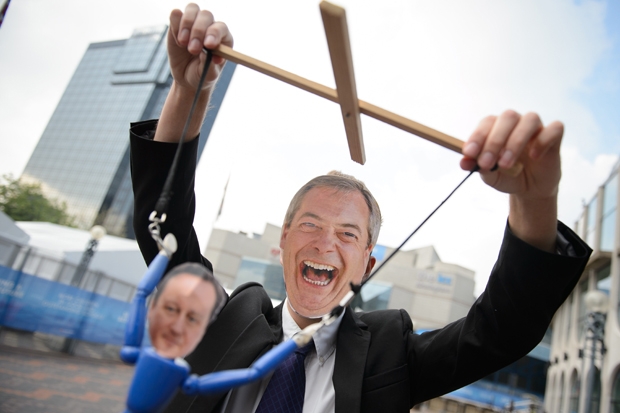I initially thought Nigel Farage had made a mistake in unveiling Mark Reckless on the final day of his party conference. Wouldn’t it have been more disruptive to announce the news during the Conservative party conference?
But after spending the first half of the week with the Tories in Birmingham, I now think it was the right decision. It put the fear of God into the party faithful. The dominant topic of conversation at the bar of the Hyatt Regency was who would be next? My colleague Dan Hodges compared the atmosphere to the Antarctic research station in The Thing, the horror film in which an alien takes on human form before transforming into a giant insect. You could never be certain the Tory MP you were talking to wouldn’t suddenly tear off his mask to reveal a purple monster.
I’ve met Nigel Farage several times and enjoy his company a good deal, but it’s hard to dismiss the suspicion that this is what he got into politics for. Forget about securing Britain’s exit from the EU. After all, our best hope of doing that is to vote Conservative and get a referendum in 2017. What really excites him is messing with David Cameron’s head. Not because he hates him, but because it’s a way of forcing the Prime Minister to pay attention to him. He wants Cameron to regret not showing people like him more respect. To borrow another film metaphor, he’s like the villain in The Incredibles who devotes his life to destroying his hero after being rejected by him as a boy. Somewhere deep in Farage’s psyche is what Freud called a ‘narcissistic scar’ — an irreparable blow to his self-esteem that has left him with an unquenchable rage. He’s not in politics to create anything, but to bring down Mr Incredible.
How did Cameron come to be the object of this fury? I suspect it’s something to do with his upper-middle-class-ness. One of the standard complaints about Farage is that his populist attacks on the metropolitan elite are at odds with his own background. Like Cameron, he’s the son of a stockbroker who went to an ancient public school. But this observation ignores one of the paradoxes of the English class system: the closer you are to someone in the social hierarchy, the more distant from them you feel. To the untrained eye, the Ukip leader may seem to be just one rung below the Prime Minister on the class ladder. But what would be a small step for man is a giant leap for Farage and his kind.
Cameron’s poshness is surely at the root of why he’s so disliked by fellow conservatives. Just by virtue of having been to Eton and Oxford, Cameron has become a proxy for all those people that Farage and his followers feel rejected by. He’s the emotionally unavailable father, the most popular boy in school and the president of the fraternity, all rolled into one. At bottom, the anti-Cameron rage on the right is due to unrequited love. It’s not a revolt so much as a revenge. The Kippers want him to suffer for all those who have sinned against them.
I don’t say this as someone who is trying to put down Ukip or belittle its leader, but because I share a lot of the same feelings. I remember experiencing a jolt of recognition when I first heard Richard Nixon’s drunken ramblings to David Frost in Peter Morgan’s play about their televised encounter: ‘No matter how many awards or column inches are written about you, or how high the elected office is, it’s still not enough. We still feel like the little man. The loser they told us we were a hundred times — the smart asses in college, the high ups. The well-born. The people whose respect we really wanted. Really craved.’
Cameron doesn’t help himself by trying to play down his poshness and appear ‘normal’. In the eyes of his detractors, that just makes him seem even more of an elitist. It’s one of the oddities of British politics that Boris, who sounds much more upper class than Cameron, makes people feel less chippy. My theory about Boris’s success if that by turning his upper-class-ness into a panto routine he renders it harmless and that, in turn, enables people to give in to their toff-worshipping instincts. We enjoy playing Baldrick to his Blackadder. Cameron, by contrast, is General Melchett. Let’s just hope he has enough troops left to win the battle next year.
Toby Young is associate editor of The Spectator.







Comments